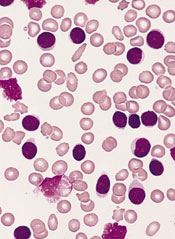
Researchers believe they’ve discovered how the Bcl-2 protein helps leukemia and lymphoma cells survive anticancer treatment.
The team found that Bcl-2 alters the level of calcium ions in cancer cells, and this promotes the cells’ survival.
The group thinks these findings, published in PNAS, could help spur the development of drugs that effectively inhibit Bcl-2 and produce better outcomes for cancer patients.
“Since 1993, our team has been conducting research on key mechanisms by which the protein Bcl-2 keeps cancer cells alive,” said study author Clark W. Distelhorst, MD, of Case Western Reserve School of Medicine in Cleveland, Ohio.
“Now, for the first time, we have evidence of how Bcl-2 is promoting abnormally long survival of the cancer cells by regulating calcium levels within cells, and [we] will use the discovery and data to deliver therapies designed to attack the Bcl-2 protein and inhibit its impact.”
More than a decade ago, researchers in Dr Distelhorst’s lab discovered that Bcl-2 binds to the inositol 1,4,5-trisphosphate receptor (InsP3R) channel and regulates the release of calcium ions.
In the current study, the team found that when Bcl-2 binds to the InsP3R channel, it initiates a complex feedback mechanism that blocks the release of calcium ions intended to induce cell death. Instead of dying, the cancer cells continue to proliferate.
Specifically, the researchers discovered that Bcl-2 interacts with the Ca2+-activated protein phosphatase calcineurin (CaN) and dopamine- and cAMP-regulated phosphoprotein of 32 kDa (DARPP-32), a CaN-regulated inhibitor of protein phosphatase 1.
Bcl-2 docks DARPP-32 and CaN on the InsP3R, creating a negative feedback loop that responds to InsP3R-mediated Ca2+ release by inhibiting InsP3R phosphorylation at Ser1755. And this prevents the excessive Ca2+ elevation that induces cell death.
The team theorized that cancer cells overexpressing Bcl-2 may exploit this mechanism to prevent apoptosis. And experiments in chronic lymphocytic leukemia cells appeared to confirm this theory.
The researchers treated the cells with the peptide TAT-IDPDD/AA, which inhibits Bcl-2–InsP3R interaction. This increased P-Ser1755 InsP3R-1 levels and elevated Ca2+, which induced apoptosis.
“We have recognized for decades that cancer cells grow and forget to die,” said Stanton Gerson, MD, director of the Case Comprehensive Cancer Center, who was not involved in this study.
“[N]ow, we understand why. I predict that this work will focus the discovery of new drugs against the Bcl-2-calcium-flow system.”

